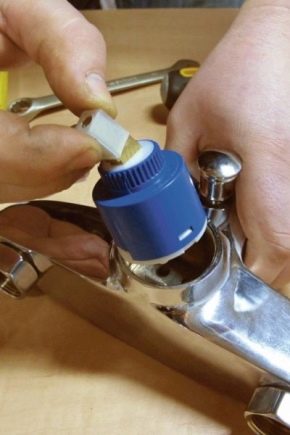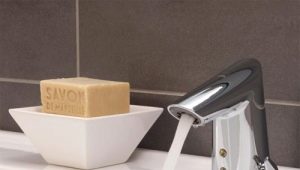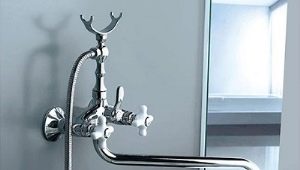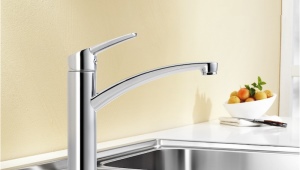The principle of the ceramic cartridge for the mixer

The heart of all mixers is the cartridge. The quality of the work of the entire device directly depends on its state. What types of cartridges are there and how do they work? This article will give a detailed answer to these questions.
Species
There are two main types of cartridges - spherical and disk with plates of metal-ceramic. The first type is used in a single-lever mixer system. Ceramic disc cartridges are usually mounted in two-valve mixers. On the external parameters, it is somewhat similar to an ordinary valve of the old type with a gasket. The most popular is the ceramic cartridge. But this does not mean at all that the ball type is worse or, on the contrary, much better than ceramic cartridges, since the operating period, like the quality of these products, is practically at the same level.
By the way, not every manufacturing company gets a license to produce ball mixers. Therefore, in order not to pay production tax, the manufacturer simply takes and displays the ceramic cartridges on the conveyor.
Any model, even Oras, will require a special filtering unit that produces mechanical water purification. The reason the mixer may be damaged is the ingress of sand grains and contaminants contained in ordinary tap water directly into the cartridge itself.
Ball
For the basis of models with a diameter of 25 mm, for example, from Nami, take a hollow ball, which has a pair of holes. One is at the bottom, the other, respectively, is located at the top. Water mixing is usually done in a cartridge. The cartridge is located on some "saddles", which are made of durable rubber material with fluoride additives. In such a "saddle" there is a special hole through which cold water is supplied from the water supply system, and through the second, respectively, hot. The ball under pressure of water closely adjoins to these "saddles".
The appearance of a leak in this case will be possible only if there are flaws of the mechanical type. - dross in plumbing, for example. The switching lever of the mixers causes the ball to rotate and makes it move. During rotation, all the holes coincide with the holes of the "saddles".A large area of such a combination leads to a strong flow of water, and vice versa, a small one - to a weak one.
Disk drives
In the single-lever mixer, more precisely, in its design, ordinary water is fed into the cartridge through the pipeline. Stirring, it goes straight into the spout itself. In this case, the temperature with the jet pressure at the exit can be controlled by the arrangement of the cartridge disks. But with a special lever you can shift the upper disc, while creating a characteristic position relative to the disc below. In the meantime, the disk protrusions at the top can be shifted using the lever, while the disk at the top will take the corresponding position with respect to the lower disk. In the meantime, the protrusions of the disk located at the top will sometimes stand firmly in the lower disk and its openings, thus the water pressure will overlap.
Even at the moment when the disk on the top will fit loosely, the protrusions will close the holes in the disk located below. Consequently, the stronger the holes close, the smaller the jet will be. The temperature of the mixed water will directly depend on the upper disk, that is, on the degree of its overlap, since it is this disk that is responsible for access to water.
But for the two-valve mixer use the same type of cartridgewhere the first is meant for cold and the second, respectively, for hot water. These cartridges, among other things, are equipped with metal-ceramic plates in a separate sleeve. When offset, these plates begin to open or block the hole, which can be 38 or 40 mm, from where the liquid flows.
Dismantling
In fact, it is possible to replace the cartridge in a couple of minutes, for this you do not need to do a complete dismantling of the case, because from above you can get to the required seat, but even here there are exceptions.
It is necessary to figure out how long the mixer was operated until the final breakdown. If you have to disassemble the mixer, then you have to unleash the threaded connections. Interference for unwinding are limestone deposits or rust, which usually tightly clamp the thread.
In the case where the installation of the locking groove is not foreseen, the mixer will turn in the hole of the sink itself - where it was installed. It's hard enough to hold the case and at the same time try to “shake up” the thread. In this case, it will also be difficult not to damage the chrome plating.Therefore, it is sometimes better to dismantle the mixers completely.
Before replacing you need not forget and completely shut off the water supply. Stages of work:
- First you need to dismantle the decorative cap. Usually on such a cap is located a pointer (hot / cold water).
- Next, the locking screw is turned out, which is located under the plug itself. After that, remove the lever.
- Then you need to remove the decorative ring, and only then loosen the nut.
- Damaged cartridge take out, replacing it. The main thing is that the existing protrusions on the cartridges coincide when installed with the holes located in the housing, since the leakage of these holes will begin.
- After the work is done, the mixer is collected back. First you need to remember to lubricate the elements that need it. Use for this better good lubrication.
All kinds of damage
When the water faucet starts to flow in the off state, it means that the cartridge has failed. The consequences of such malfunctions can lead to the flooding of a neighboring apartment and to the receipt of huge utility bills.
When the water faucet starts to drip even when closed, during the switching of the “In the shower” (“Rain”) mode, water flows from the spout, in this case you will have to figure out whether you will have to completely replace the mixer or just put a new cartridge. The reason that the tap lets water through is basically a worn shut-off mechanism. It may also be that the cartridge just cracked.
Accordingly, when the crane starts to turn with difficulty, creaks or even buzzes, there are several reasons for this:
- The cartridge itself was simply chosen incorrectly, that is, it did not fit the size. Consequently, the diameter of the spout is slightly less than the output of the cartridge itself, or the stock may be slightly longer. The lever in the end simply can not rotate freely.
- When the faucet is too noisy, all this accordingly affects the pressure drop across the entire system. Usually, in order to eliminate such a problem, replace the seal, that is, the gasket in the crane box itself. Of course, it is better to check the seal and its condition every 2-3 months in preventive measures.
How to replace the ceramic cartridge on the mixer, see the following video.












































